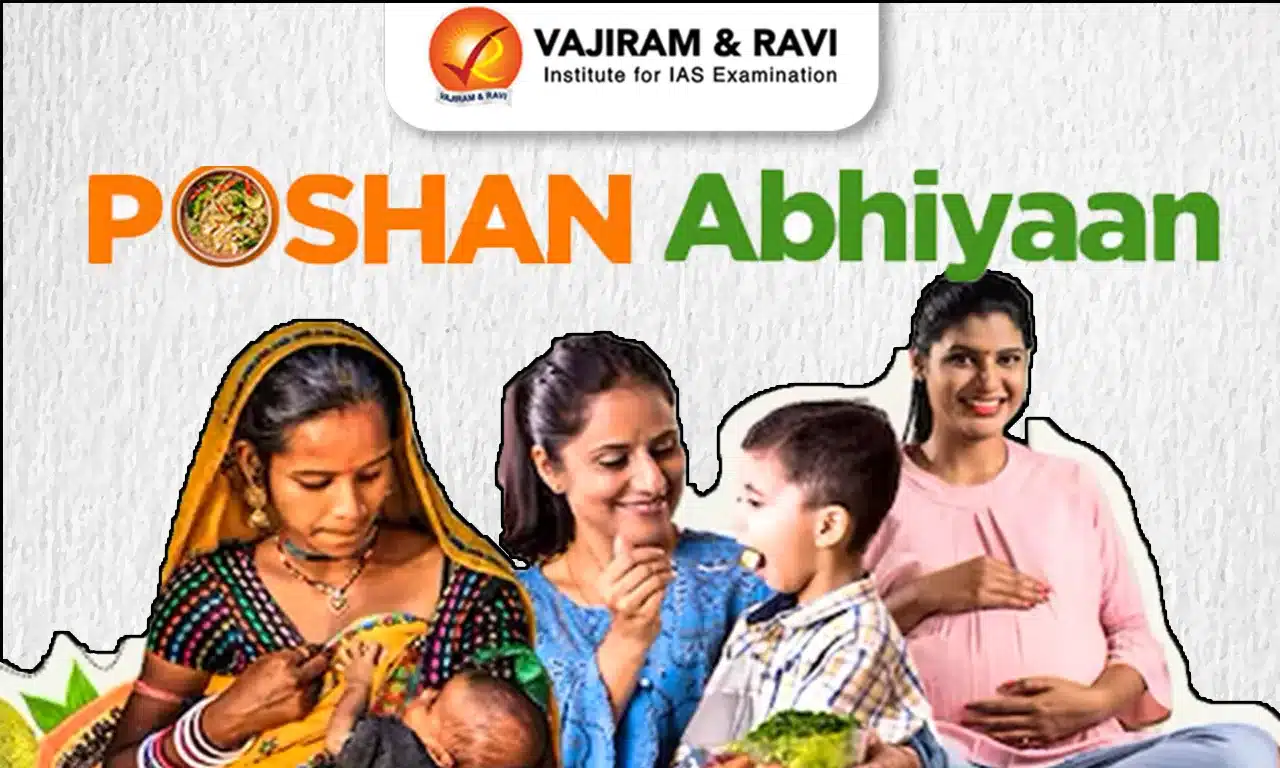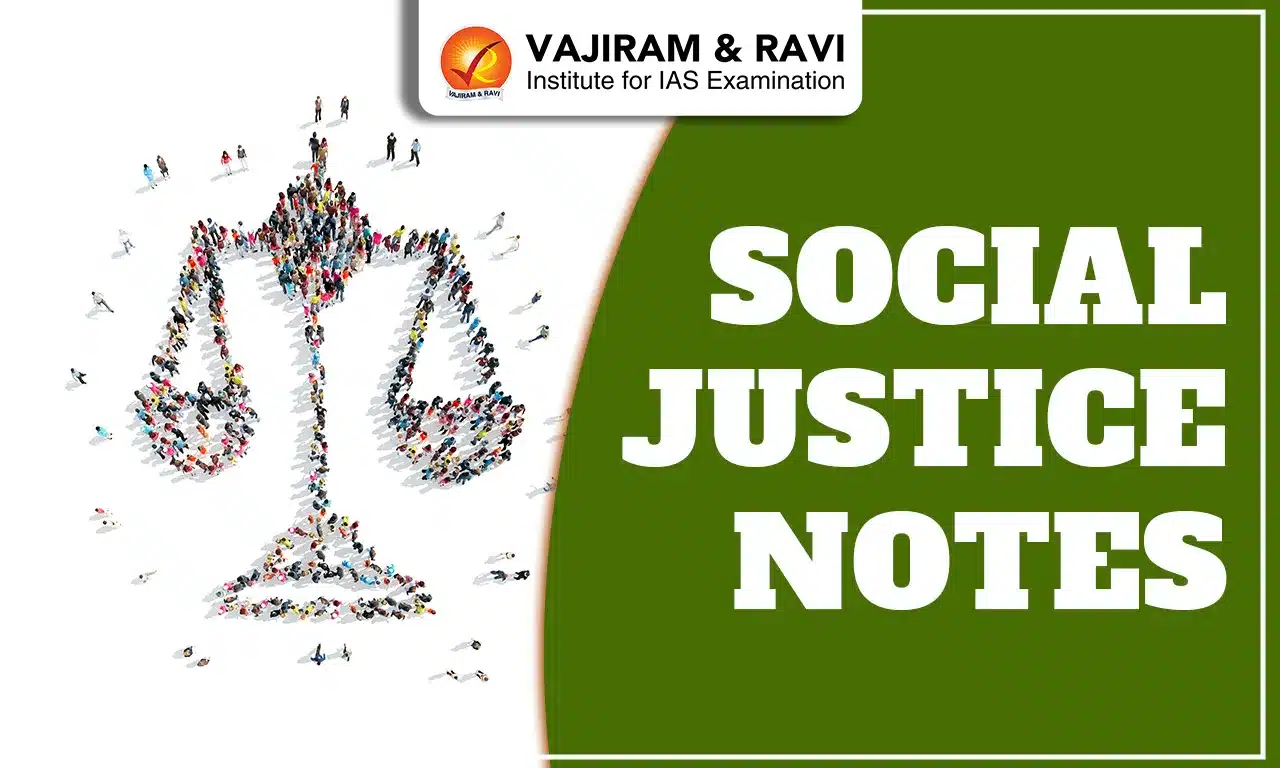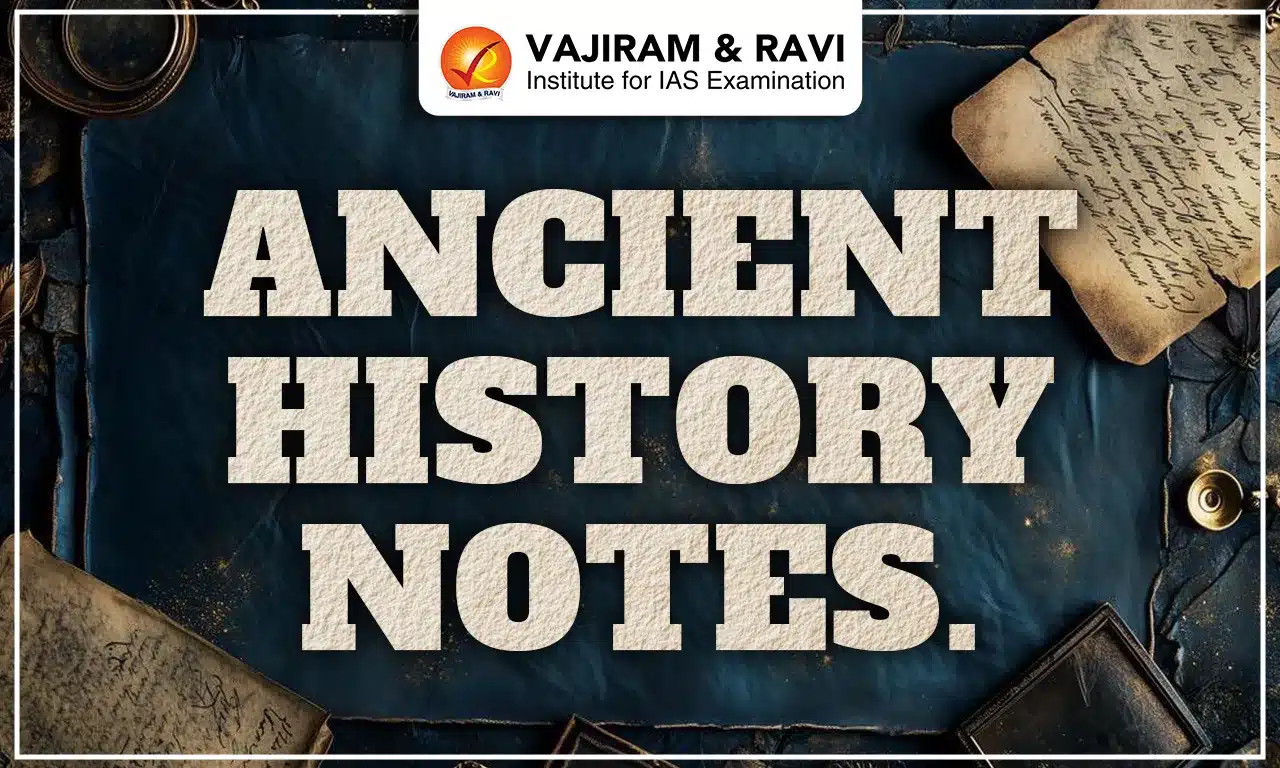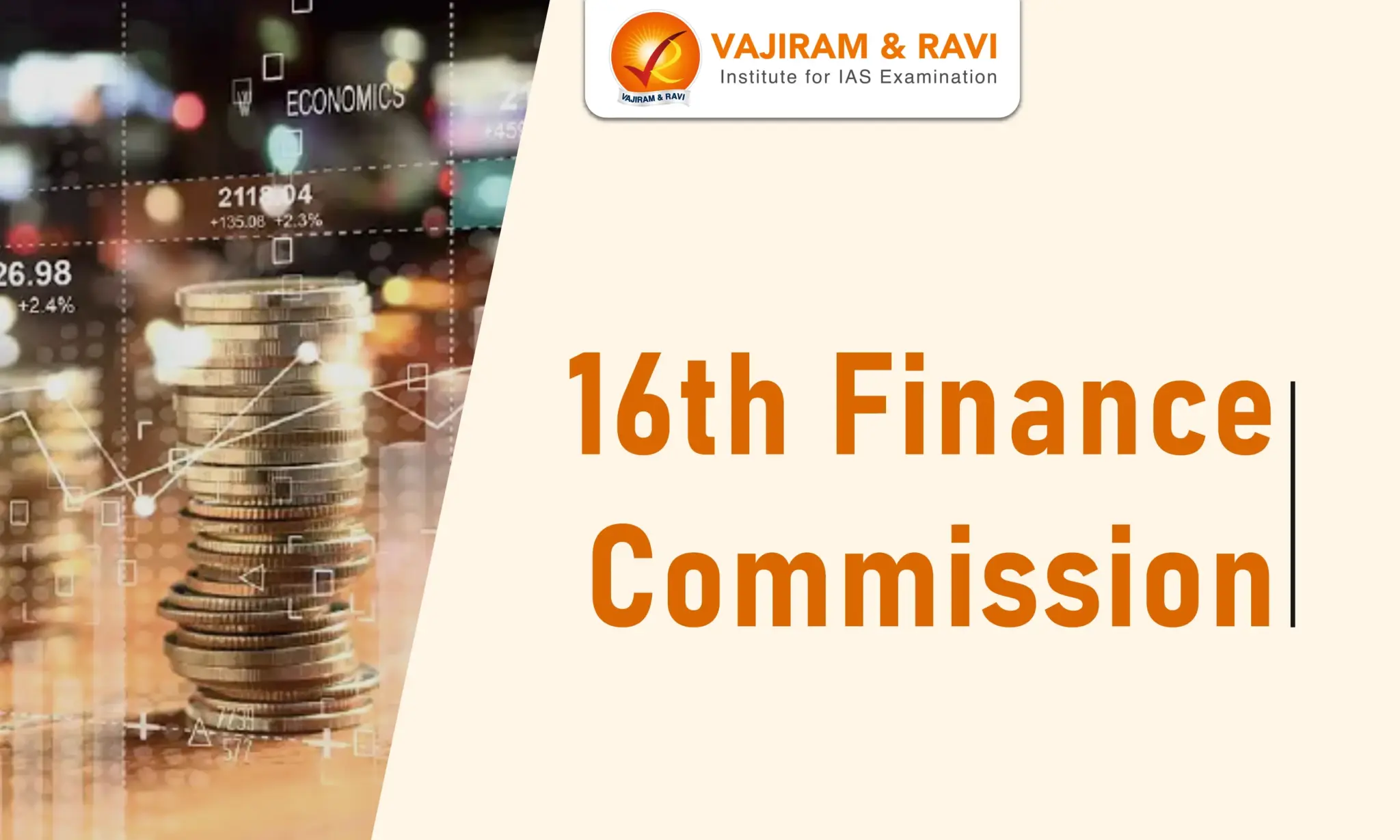Poshan Abhiyaan is a flagship multi-ministerial initiative by the Government of India aimed at combating malnutrition, reducing stunting, undernutrition, and anaemia among children and women. Led by the Ministry of Women and Child Development, it integrates various schemes to deliver holistic nutrition services through a coordinated, technology-driven approach.
Mission’s strategic focus includes behaviour change communication, convergence of services, real-time monitoring, community participation through Jan Andolan, and promotion of sustainable dietary habits such as millet consumption. Now restructured under Mission POSHAN 2.0, the initiative continues to address nutrition-related challenges by enhancing operational efficiency and strengthening grassroots implementation mechanisms.
Poshan Abhiyaan Overview
Poshan Abhiyaan is a multi-ministerial initiative launched by the Government of India in March 2018. The mission aims to reduce malnutrition and stunting, address anaemia among children and women, and improve overall health outcomes in the country. It is implemented by the Ministry of Women and Child Development and collaborates with various ministries, states, and stakeholders to achieve its goals.
Poshan Abhiyaan Targets
Poshan Abhiyaan is a multi-ministerial initiative launched by the Government of India in March 2018. Poshan Abhiyaan has set specific targets to be achieved by 2022, focusing on improving nutritional outcomes and reducing malnutrition. Key Targets of Poshan Abhiyaan are as follows:
- Reduction in Stunting among children aged 0-6 years by 2% annually, to achieve a 25% reduction by 2022.
- Reduction in Underweight Children: targeting a 2% annual reduction in the prevalence of underweight children.
- Reduction in anaemia among children, adolescents, and women by 3% annually.
- Reduce Low Birth Weight in infants by 2% annually.
- Reduction in Child Wasting targeting a 2% annual reduction.
Poshan Abhiyaan Features
Poshan Abhiyaan is characterised by its comprehensive approach and innovative features that aim to transform India's nutritional landscape. The following are the prominent features of the mission:
- Convergence of Schemes: Poshan Abhiyaan integrates various services and schemes, such as the Integrated Child Development Services (ICDS), Pradhan Mantri Matru Vandana Yojana (PMMVY), and Mid-Day Meal Scheme, to ensure a holistic approach to nutrition.
- Technology Driven Interventions: Uses ICDS-Common Application Software (ICDS-CAS) for real-time monitoring and data capture by Anganwadi workers.
- The Poshan Tracker, launched in March 2021, complements ICDS-CAS by providing a user-friendly interface for tracking service delivery and nutritional outcomes, with smartphones provided to Anganwadi centres.
- Jan Andolan Strategy: Poshan Abhiyaan emphasises community involvement through the Jan Andolan strategy, encouraging participation from local communities, civil society, and grassroots organisations.
- Training of Anganwadi Workers: Capacity building and training programs are conducted highlighting cooperative efforts among the frontline staff, such as through joint incentives based on success for the 3As (ASHA, Anganwadi, and ANM).
- Enhancing the abilities of frontline employees with the Incremental Learning Approach (ILA) method.
- Nutrition Rehabilitation Centre: To provide specialised care and treatment for severely malnourished children.
- Progress Tracking: Regular monitoring and evaluation of program outcomes to assess progress and make necessary adjustments in strategies.
Poshan Abhiyaan Five Pillars
Poshan Abhiyaan is built on primary pillars of the mission and the implementation includes ICDS-CAS, Convergence, Behavioural change, IEC Advocacy, Training and Capacity building, Innovations, Incentives, Grievance Redressal, each addressing specific aspects of nutrition and health.
- ICDS-CAS (Common Application Software): Leverages technology to improve ICDS service delivery and monitoring.
- Convergence: Coordinates resources and activities across ministries for a holistic approach.
- Behavioural Change: Promotes healthy practices through Information, Education, and Communication (IEC) campaigns.
- Innovations: Supports creative solutions, such as nutri-gardens and community-driven nutrition projects.
- Incentives: Rewards states and union territories based on program performance
POSHAN Abhiyaan Programme Priorities
Mission 2.0 adopts a holistic and integrated approach focused on the critical first 1000 days to ensure optimal nutrition and healthcare for mothers and children. It emphasises Jan Andolan for behaviour change, multi-sectoral convergence, and technology-driven service delivery through platforms like ICDS-CAS to build a malnutrition-free India.
- The first 1000 days – A critical window of opportunity: play a crucial role in ensuring optimal nutrition and healthcare for both mother and baby, laying the foundation for long-term health and development.
- Jan Andolan: Recognising that sustainable improvements in nutrition require collective action, the Prime Minister has called upon multiple stakeholders to drive a mass movement (Jan Andolan) for a malnutrition-free India.
- Multi-sectoral convergence: To facilitate effective multi-sectoral coordination, a National Council on India’s Nutrition Challenges under the Chairpersonship of Vice Chairman NITI Aayog has been established.
- The Council provides policy directions and reviews convergence between Ministries and programmes for nutrition every quarter.
- Service delivery through technology: POSHAN Abhiyaan delivers services through existing schemes like ICDS-CAS. This is a mobile application to strengthen the delivery of Anganwadi Services. Anganwadi workers capture the data on their mobiles.
Poshan Abhiyaan Funding
Poshan Abhiyaan and Mission POSHAN 2.0 are primarily funded by the central government, with contributions from state governments and support from international partners like UNICEF and the World Bank.
MISSION POSHAN 2.0
Government has merged several programs with overlapping goals, like the Supplementary Nutrition Programme and POSHAN Abhiyaan, into a single, streamlined initiative called Mission POSHAN 2.0. This consolidated effort is designed to enhance coordination, promote operational efficiency, and implement a holistic approach to delivering nutrition services.The objectives of Poshan 2.0 are as follows:
- To contribute to the human capital development of the country;
- Address the challenges of malnutrition.
- Promote nutrition awareness and good eating habits for sustainable health and well-being.
- Address nutrition-related deficiencies through key strategies.
Poshan Abhiyaan Significance
Poshan Abhiyaan holds immense significance in India's efforts to combat malnutrition and improve health outcomes. Its comprehensive approach and focus on multi-sectoral collaboration make it a vital initiative for national development.
- Combating Malnutrition: Poshan Abhiyaan addresses the pervasive issue of malnutrition, which affects millions of children and women in India, leading to improved health and well-being.
- Promoting Child Development: By focusing on early childhood nutrition, the mission enhances child development and cognitive abilities, contributing to a healthier and more productive population.
- Empowering Women: The mission empowers women by ensuring better nutrition and health, reducing anaemia, and promoting maternal well-being.
- Enhancing Public Health: Improved nutrition leads to better public health outcomes, reducing the burden of diseases and enhancing the quality of life.
- Economic Growth: By addressing malnutrition and improving health, Poshan Abhiyaan contributes to economic growth by increasing productivity and reducing healthcare costs.
Poshan Maah (National Nutrition Mission)
National Nutrition Mission (NNM), popularly known as Poshan Maah (Nutrition Month), is an integral part of Poshan Abhiyaan, celebrated annually in September to raise nutritional awareness among mothers, adolescent girls, pregnant and lactating women, family members, and healthcare providers about essential nutrition behaviour.
Poshan Vatika
Poshan Vatika, also known as Nutri-gardens, are small, localised gardens, often at or near Anganwadi centres (community health centres), designed to provide easy and affordable access to a variety of fruits, vegetables, and medicinal plants, primarily for women and children. The aim is to enhance dietary diversity and improve nutritional outcomes by providing fresh, locally produced, and nutrient-rich food.
Poshan Abhiyaan Significance of Millets
Millets, often referred to as "nutri-cereals," play a significant role in Poshan Abhiyaan's strategy to improve nutrition. These nutrient-rich grains are a valuable addition to the dietary interventions promoted by the mission.
Nutritional Benefits of Millets
For better nutrition and health, millets are a great choice because they are high in antioxidants, low in glucose, gluten-free, and supportive of sustainable agriculture.
- Rich in Nutrients: Millets are rich in essential nutrients, including fibre, protein, vitamins, and minerals, making them an ideal food for combating malnutrition.
- Gluten-Free: Being gluten-free, millets are suitable for individuals with gluten intolerance or celiac disease, promoting inclusive nutrition.
- Low Glycemic Index: Millets have a low glycemic index, making them beneficial for managing diabetes and preventing spikes in blood sugar levels.
- Antioxidants: Millets are rich in antioxidants, which may lower the risk of cancer and shield against oxidative stress.
- Sustainable Agriculture: Millets are resilient to climate change and require fewer resources to grow, making them a sustainable choice for agriculture.
Integration of Millets in Nutrition Programs
Millets are being incorporated into ICDS and Mid-Day Meal Schemes, supported by awareness campaigns and initiatives to promote sustainable farming and market access for millet farmers.
- Promotion in ICDS and Mid-Day Meal Schemes: Millets are being incorporated into the Integrated Child Development Services (ICDS) and Mid-Day Meal Schemes to enhance the nutritional quality of meals provided to children.
- Awareness Campaigns: Poshan Abhiyaan promotes awareness campaigns to educate communities about the benefits of millets and encourage their consumption.
- Support for Millet Farmers: The mission supports millet farmers by promoting sustainable farming practices and ensuring market access for their produce.
Poshan Abhiyaan Way Forward
Poshan Abhiyaan is a transformative initiative that addresses malnutrition and promotes better nutrition across India. With its multi-sectoral approach, focus on community participation, and emphasis on technology-driven solutions, the mission aims to achieve significant improvements in nutritional outcomes.
- Monitoring and Evaluation: Regularly monitoring progress and evaluating the impact of the program to identify areas for improvement and ensure accountability.
- Sustained Efforts: Continuing to invest in human resources, infrastructure, and training to ensure the long-term success of the program.
- Promoting Healthy Behaviors: Encouraging healthy dietary practices, proper hygiene, and regular health checkups.
- Poshan Pakhwada: Utilising the annual Poshan Pakhwada as a platform to raise awareness and promote community participation.
Implementation faces challenges like regional disparities, logistical constraints in rural areas, and varying state-level capacities. Mission POSHAN 2.0 aims to address these through targeted interventions and enhanced coordination.
Poshan Abhiyaan UPSC PYQs
Q1. Which of the following are the objectives of ‘National Nutrition Mission’? (UPSC Prelims 2017)
- To create awareness relating to malnutrition among pregnant women and lactating mothers.
- To reduce the incidence of anaemia among young children, adolescent girls and women.
- To promote the consumption of millets, coarse cereals and unpolished rice.
- To promote the consumption of poultry eggs.
Select the correct answer using the code given below:
(a) 1 and 2 only
(b) 1, 2 and 3 only
(c) 1, 2 and 4 only
(d) 3 and 4 only
Ans: (a)
Q2. Which of the following is/are the indicator/indicators used by IFPRI to compute the Global Hunger Index Report? (UPSC Prelims 2016)
- Undernourishment
- Child stunting
- Child mortality
Select the correct answer using the code given below:
(a) 1 only
(b) 2 and 3 only
(c) 1, 2 and 3
(d) 1 and 3 only
Ans: (c)
Last updated on February, 2026
→ UPSC Notification 2026 is now out on the official website at upsconline.nic.in.
→ UPSC IFoS Notification 2026 is now out on the official website at upsconline.nic.in.
→ UPSC Calendar 2026 has been released.
→ Check out the latest UPSC Syllabus 2026 here.
→ Join Vajiram & Ravi’s Interview Guidance Programme for expert help to crack your final UPSC stage.
→ UPSC Mains Result 2025 is now out.
→ UPSC Prelims 2026 will be conducted on 24th May, 2026 & UPSC Mains 2026 will be conducted on 21st August 2026.
→ The UPSC Selection Process is of 3 stages-Prelims, Mains and Interview.
→ Prepare effectively with Vajiram & Ravi’s UPSC Prelims Test Series 2026 featuring full-length mock tests, detailed solutions, and performance analysis.
→ Enroll in Vajiram & Ravi’s UPSC Mains Test Series 2026 for structured answer writing practice, expert evaluation, and exam-oriented feedback.
→ Join Vajiram & Ravi’s Best UPSC Mentorship Program for personalized guidance, strategy planning, and one-to-one support from experienced mentors.
→ UPSC Result 2024 is released with latest UPSC Marksheet 2024. Check Now!
→ UPSC Toppers List 2024 is released now. Shakti Dubey is UPSC AIR 1 2024 Topper.
→ Also check Best UPSC Coaching in India
Poshan Abhiyaan FAQs
Q1. What is the aim of POSHAN Abhiyaan?+
Q2. When was PM Poshan Abhiyaan launched?+
Q3. Who is the beneficiary of Poshan Abhiyan?+
Q4. What are the four pillars of POSHAN Abhiyaan?+
Q5. What are the 5 Poshan Sutras?+


















